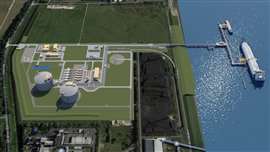Read this article in 中文 Français Deutsch Italiano Português Español
German LNG terminal gets EU approval
August 01, 2023
Facility must be converted to import renewable energy by 2043
 The European Commission has approved, under EU State aid rules, a €40 million German support measure for the construction and operation of a new land-based liquefied natural gas (LNG) terminal in Brunsbüttel. (Image: Gasunie)
The European Commission has approved, under EU State aid rules, a €40 million German support measure for the construction and operation of a new land-based liquefied natural gas (LNG) terminal in Brunsbüttel. (Image: Gasunie)
Dutch gas grid operator Gasunie and German energy firm RWE have received a €40 million ($44 million) German state aid measure for the construction of the planned onshore LNG import terminal in Brunsbüttel.
The European Commission approved the German state aid measure for the construction and operation of the new LNG land terminal. The German LNG Terminal (GLNG) is expected to regasify and feed some 10 billion cubic meters of natural gas into the German grid annually from the end of 2026. The total investment volume of the project is approximately €1.3 billion and will consist of three shareholders: the German government through the investment and development bank KfW with a 50% share; Gasunie with a 40% share; and RWE with a 10% share. Gasunie will remain 100% operator of the project and future terminal.
Under the EU measure, the aid will take the form of a preferential dividend distribution mechanism: KfW will give to its co-investors a share of the dividends paid by GLNG if the project’s annual return is below a fixed percentage of the total capital invested by all shareholders, including KfW. If the annual return is above a fixed percentage of the total invested capital, KfW will not share the dividends and thus no aid will be paid under the measure. The amount of aid disbursed under the measure will depend on the annual returns but is expected to amount to €40 million. KfW plans to exit the project after 15 years of operation of the LNG terminal, when the preferential dividend distribution mechanism will stop.
“The LNG terminal will be constructed taking into account the technical specifications necessary to allow its conversion into a terminal for the import of renewable energy carriers (e.g. renewable hydrogen or renewable hydrogen derivates), thereby avoid a lock-in of gas,” according to the EU. “The terminal will be converted after 15 years of operation, at the latest by 2043.”
According to Gasunie, the facility will contribute to the security and diversification of Germany’s energy supply and help end dependence on Russian fossil fuels in line with the REPowerEU plan. That’s why his terminal will make a significant contribution to German and European natural gas supplies in the coming years, the company said.
MAGAZINE
NEWSLETTER

CONNECT WITH THE TEAM









